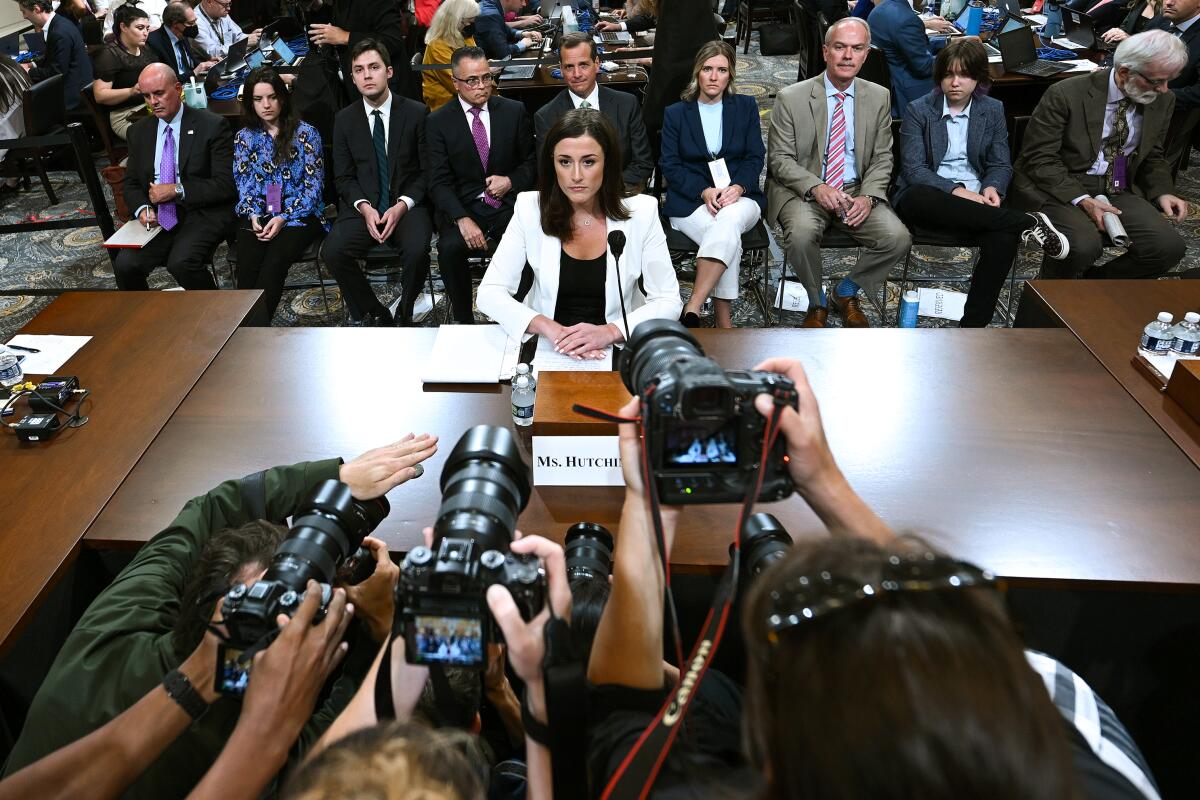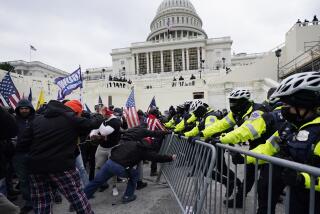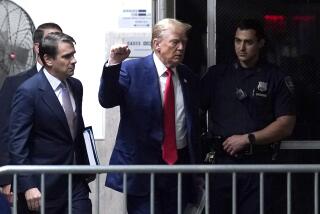Star Jan. 6 witness told committee that lawyer linked to Trump tried to silence her

- Share via
WASHINGTON — The Trump-aligned lawyer who initially represented former White House aide Cassidy Hutchinson instructed her to downplay her knowledge of what happened during the Capitol insurrection, Hutchinson told the House select Jan. 6 committee in testimony made public Thursday.
“We’re going to downplay your role,” attorney Stefan Passantino told Hutchinson, according to her testimony. “You were a secretary ... the less you remember, the better.”
The details of the apparent Trumpworld pressure campaign on one of the committee’s key witnesses were among a number of revelations in a handful of deposition transcripts the committee made public Thursday. The panel’s final report, the closing salvo of its 18-month-long investigation, has not yet been released.
Hutchinson parted ways with Passantino after several spring 2021 appearances before the committee in which she felt she was giving untruthful or incomplete answers, she said. After switching attorneys, she provided some of the most dramatic live testimony of the panel’s nine hearings this year.
According to Hutchinson, Passantino did not want her to tell the committee that former President Trump had lunged at his security detail when they refused to take him to the Capitol during the riot on Jan. 6, 2021.
Hutchinson felt she had no other option but to retain the Trump-aligned lawyer because she couldn’t afford to pay the high costs of other attorneys she contacted while seeking representation, she told the committee in two days of depositions in September.
Passantino would not tell her who was paying for his legal services, Hutchinson told the committee, and she soon became leery, suspecting he was more concerned about Trump and other high-ranking former White House officials than he was about her.
“‘I am completely indebted to these people,’” she recalled telling her mother. “I was like, ‘And they will ruin my life, Mom, if I do anything that they don’t want me to do.’”
Passantino encouraged her to downplay her role as one of former White House Chief of Staff Mark Meadows’ most trusted aides, she said, and urged her to answer questions with the phrase “I cannot recall” even when she had clear memories of what had happened.
Hutchinson said Passantino and others in Trump’s orbit, including Meadows through an intermediary, kept reminding her to be “loyal” and repeatedly spoke of finding her a well-paying job after her interviews with the committee.
“‘We just want to focus on protecting the president. We all know you’re loyal,’” Hutchinson said Passantino told her.
In a statement first reported by CNN, Passantino said he represented Hutchinson, as he had other clients, “honorably, ethically, and fully consistent with her sole interests as she communicated them to me.”
Also released Thursday were transcripts of the committee’s interviews with Chris Krebs, former director of Homeland Security’s Cybersecurity and Infrastructure Security Agency; convicted Jan. 6 rioter Stephen Ayres; former Defense Secretary Mark Esper; Justice Department employee Ken Klukowski; and Sarah Matthews, a former deputy White House press secretary.
Klukowski, whose transcript shows he told the committee he could not recall the answers to most of their questions, has connections to some of the most influential players in the effort to overturn the results of the 2020 election.
In his June 10 deposition, Klukowski confirmed that he had worked for the Trump campaign in the weeks before he joined the Justice Department on Dec. 15, 2020. While he was with the campaign, Klukowski worked with conservative California lawyer John Eastman, who was behind the theory that the vice president could reject states’ electors or send results back to the states for more consideration.
Rep. Liz Cheney (R-Wyo.) said in a June 23 hearing that Klukowski helped Jeffrey Clark, head of the Justice Department’s civil division, draft a letter that Clark wanted agency leaders to send to lawmakers in Georgia and other states. The letter claimed, falsely, that the Justice Department believed there were problems with those states’ elections and urged them to consider overriding the certified results that showed Trump had lost to current President Joe Biden.
Trump would later attempt to make Clark acting attorney general after Justice Department leaders refused to issue the letter.
Trump and his allies needed state lawmakers to consider overturning their election results, or for Vice President Mike Pence to throw out certain state electors, in order to keep Trump in power.
Matthews’ interview focused on the pressure she said Trump had put on his White House staff to echo his election fraud theories, and on aides’ efforts to convince him to issue a statement calling off rioters on Jan. 6.
In the days after the 2020 election, Trump repeatedly pressured then-Press Secretary Kayleigh McEnany to discuss bogus election claims from the White House podium, Matthews told the committee in a Feb. 8 interview. A law called the Hatch Act bars White House staff from discussing campaign-related matters.
“I know that post-election, [McEnany] did try to actively avoid the president because he wanted her to do the briefings from the podium about the campaign, and wanted her to talk about Dominion,” Matthews told committee investigators, referring to the voting machine company that conspiracy theorists falsely accused of helping to rig the election.
When it became apparent that Jan. 6 that the rioters were going to get inside the Capitol, McEnany ordered the White House press team to not talk to reporters, Matthews said.
“I think she said that Meadows, the chief of staff, did not want us to comment on it at the time,” Matthews said, adding that later in the day McEnany claimed the rioters could be leftist protesters.
“There was an acknowledgment of, ‘Well, it could be antifa, and so we don’t want to comment on this right now because we don’t know what’s happening,’” she said.
Matthews also told the committee that her colleague Chad Gilmartin — a cousin of McEnany’s husband — had suggested that Trump should not condemn the violence because it would give the media a “win.”
“I pointed at the TV and said, I guess yelled, ‘Do you think we’re winning right now?’” Matthews added.
The committee’s April 1 interview with Esper focused on Trump’s desire to use the military to respond to racial justice protests in the summer of 2020.
Esper told the committee that Trump told him on June 1, 2020, that he wanted to deploy up to 10,000 troops to the Capitol to respond to the protests. Trump told him that the protests “made him look weak,” Esper told the committee.
In the days that followed, Esper made clear, he said, that he did not think the summer 2020 protests warranted invoking the Insurrection Act, which would have allowed the president to deploy the military. Esper said Trump summoned him to the White House and “was quite upset and yelling” about the remarks.
Times reporters Arit John, Freddy Brewster and Courtney Subramanian contributed to this report.
More to Read
Get the L.A. Times Politics newsletter
Deeply reported insights into legislation, politics and policy from Sacramento, Washington and beyond. In your inbox twice per week.
You may occasionally receive promotional content from the Los Angeles Times.










